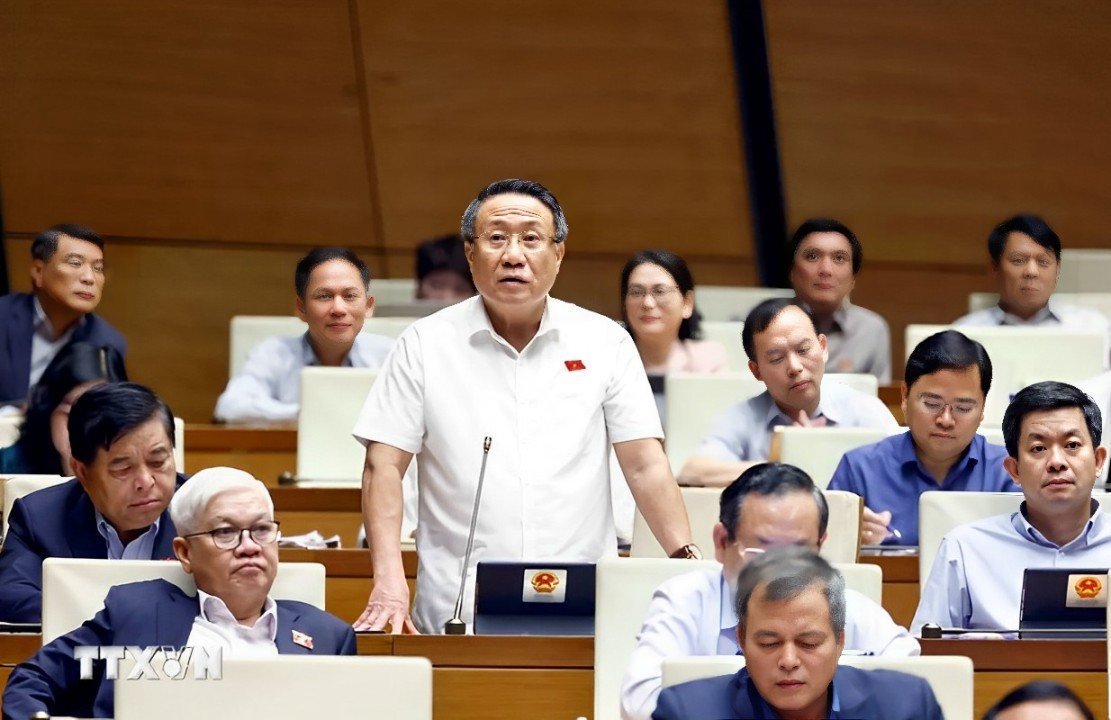According to delegate Nguyen Quang Huan, the use of FDI is an opportunity for growth, but not the main driving force for the upcoming era of growth.
On the morning of November 5, continuing the session program, the National Assembly discussed in the hall the implementation of the state budget in 2024, the state budget estimate, and the central budget allocation plan in 2025.
Commenting on the discussion, delegate Nguyen Quang Huan (Binh Duong) said that according to the audit report, the current allocation of recurrent expenditure is still low, and many amounts have not been allocated, inhibiting the stimulus tools of the economy. And it is expected that by 2025, our country's GDP will be about 500 billion USD, if the growth rate is maintained at 7% per year, by 2035, our country's GDP will be about 1000 billion USD, with a vision to reach 5000 billion USD by 2045 to become a high-income country, breaking the middle-income trap.
"To escape this trap, there are many tools in aspects such as labor, restructuring, and development investment, but we have not paid enough attention to these aspects," the delegate commented.
According to the delegate, maintaining growth of nearly 7%/year, but we have not achieved the sustainable factor because we still rely on the motivation of FDI. While FDI enterprises have a large trade surplus, domestic enterprises have a trade surplus. If we want to maintain a sustainable pace of development, we need to rely on domestic development resources.
Currently, we have more than 20 Funds, some of which are about to close, while some of them will be opened. Delegates proposed to supervise the Funds to have a specific and thorough assessment, ensuring effective management and use. The Fund should not be evaluated by the number of projects, but it is necessary to consider the effectiveness of the Fund's operations, the impact of the Fund on the overall growth of the economy.
"The monitoring of the activities of the Funds will be the premise of building a sustainable mechanism, the use of FDI is an opportunity for growth, but not the main driving force for the upcoming era of growth," the delegate emphasized.
.jpg) National Assembly delegate of Hanoi city Hoang Van Cuong speaks. (Photo: Minh Duc/VNA
National Assembly delegate of Hanoi city Hoang Van Cuong speaks. (Photo: Minh Duc/VNA
Discussing in the hall, delegate Hoang Van Cuong (Hanoi) affirmed that public investment has created a breakthrough for development, but investment in high-quality human resources has not been paid enough attention, investment in facilities in the fields of education and health is still limited. Therefore, the biggest concern of public hospitals or universities today when they are autonomous is to pay interest loans to banks when investing in facilities and technical infrastructure.
"This causes hospitals and universities to increase hospital fees or higher tuition fees. Therefore, patients and learners have to pay high service fees," the delegate emphasized.
With the above facts, delegate Hoang Van Cuong suggested that it is necessary to increase the allocation rate of development investment capital from the State budget for the two fields of health and education, at least enough to invest in the construction of initial facilities. After the investment is completed, the management agency should assign schools and hospitals to implement autonomy to reinvest and take care of regular expenses. Thus, patients and learners will not have to pay high service fees.
Paying attention to non-budget state financial funds that have not been thoroughly considered, delegate Ha Sy Dong (Quang Tri) said that according to the Government's report, the total balance at the beginning of 2024 of non-budget state financial funds managed by the Central Government is mainly that of the three funds, including: Social Insurance Fund, Unemployment Insurance Fund and Health Insurance Fund managed by Vietnam Social Insurance, accounting for nearly 91% of the total balance of funds.
It is estimated that by the end of this year, the balance of funds will increase by about VND 56,000 billion compared to the beginning of the year. In which, the balance of the three funds managed by the Vietnam Social Insurance accounts for over 91% of the total balance of the funds, equivalent to about VND 1,300 billion.
"The balance is mainly used to invest in government bonds. The problem is what is the structure and quality of capital use of the capital of nearly 1.3 million billion VND, what is their ability to preserve and profitability, and accordingly, whether the mission of ensuring social security of the social insurance agency is completed? The Government's report also does not clarify this, including the issues mentioned by other delegates, such as the current situation of social insurance arrears," Ha Sy Dong discussed.
 National Assembly delegate of Quang Tri province Ha Sy Dong speaks. (Photo: Doan Tan/VNA)
National Assembly delegate of Quang Tri province Ha Sy Dong speaks. (Photo: Doan Tan/VNA)
Delegate Ha Sy Dong said that, according to experts, accounting for most of the capital use structure of Social Insurance is the asset item of Vietnamese Government bonds, while there are liquidity risks and market risks but have never been managed by agencies. as well as the Social Insurance agency itself identifies, measures and announces.
Regarding the management of the remaining deposits of the State Treasury, delegate Ha Sy Dong said that thanks to political determination, since 2017, the Ministry of Finance has gradually shifted according to the roadmap of the amount of outstanding money deposited by the State Treasury at the commercial banking system to the State Bank in order to create favorable conditions for the State Bank in its main administration the country's monetary book...
However, in practice, the implementation process has not really gone smoothly, as reflected in the State Treasury's bidding for deposits back at commercial banks, which are sometimes inappropriate in terms of timing, dosage, term, or interest rate.
"Such things have often made the State Bank passive and difficult in regulating the money supply for the banking system and the economy, in order to achieve the goal of monetary stability and bank operations. Therefore, the National Assembly and the Government will soon review the regulations and remove the current bottlenecks in the best way," the delegates suggested./.





















